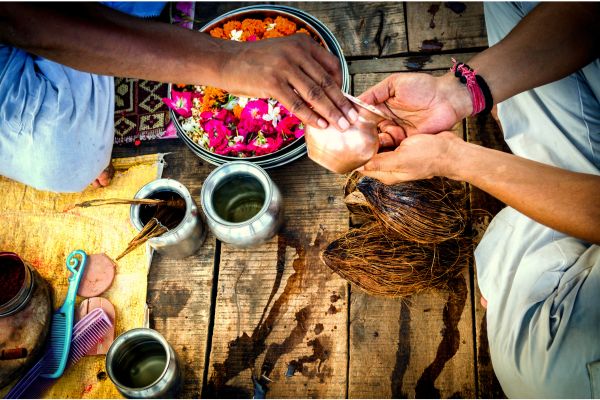Have you ever noticed how, after attending a funeral or cremation, you’re advised—or even required—to take a bath before reentering your home or engaging with others? This isn’t just a random ritual passed down through generations. Across many cultures, especially in Hinduism, Buddhism, and other Eastern traditions, bathing after funeral rites is considered an essential act—one that carries both spiritual and practical significance.
Funerals and cremations are powerful events that mark the end of life’s journey. They involve rituals designed to offer peace to the departed soul and provide closure to grieving families. But these ceremonies are also believed to expose attendees to energies of mourning and detachment—energies that, according to spiritual beliefs, should not be carried back into the home. Taking a bath serves as a symbolic and physical form of purification, allowing individuals to cleanse themselves of sorrowful vibrations and restore balance.
Table of Contents
ToggleReligious and Traditional Beliefs Behind Bathing After Funerals and Cremations
In Hinduism, attending a funeral or cremation is not only an emotional experience but also a spiritually significant one. According to sacred Hindu scriptures, places where last rites are performed—such as cremation grounds—are believed to be filled with negative energies and spiritual impurities. The deceased body, though deeply respected, is also considered ritually impure. Because of this, it is customary for anyone who attends or performs the funeral rituals to take a ceremonial bath immediately afterward.
This bath is not just for physical cleanliness; it serves as a spiritual purification to cleanse the body and soul of any negative or heavy energies absorbed during the ceremony. It is also required to wash the clothes worn during the funeral before reentering the home. Simply sprinkling water or chanting purifying mantras is not considered enough to remove the spiritual impurities associated with cremation grounds.
Additionally, in Hindu tradition, visiting the home of the deceased or coming into physical contact with their close family members—known as “Sutakas”—also necessitates ceremonial bathing. These family members are believed to remain in a state of ritual impurity for up to 13 days after the death, and interacting with them during this period is spiritually significant.
Read More: What Are Hindu Death Rituals and Why Are They Important?
Scientific Reason Behind Bathing After Funerals and Cremations
While religious beliefs emphasize spiritual purification, science also offers practical explanations for the custom of bathing after attending a funeral or cremation. When a person dies, their body begins to decompose almost immediately. As this process starts, the body loses its natural ability to fight off bacteria, making it a host for microorganisms involved in decomposition.
People who attend funerals or come in close contact with the deceased may be exposed to these bacteria, which can potentially lead to infections or the spread of illness. Bathing after the funeral serves as an important hygiene practice to wash off any bacteria or germs that may have come into contact with the skin or clothing.
From a scientific point of view, this simple act of cleansing helps protect individuals and their families from the risk of contamination. It also explains why people are advised not to touch others or enter their homes without first bathing and changing their clothes. Thus, while rooted in religious traditions, the custom of bathing after funerals also has strong scientific relevance as a health and safety measure.
Read More: What is Shraddha Ceremony? Importance and Rituals Explained
Myths About Taking Bath After Attending Funeral or Cremation
Myth: Taking a bath after attending a funeral can prevent bad luck.
Fact: There is no scientific or proven evidence that bathing after a funeral can influence luck or prevent misfortune. The idea of warding off bad luck through this ritual is more of a cultural belief than a fact. However, what taking a bath does achieve is maintaining personal hygiene and reducing the risk of infections. Since funeral and cremation sites may expose attendees to germs and bacteria from the deceased body, bathing afterwards helps clean the body and lower the chances of falling ill.
Myth: Bathing after a funeral protects you from evil forces or negative energies.
Fact: While the concept of evil forces is spiritual and varies by belief systems, many people find that taking a ceremonial bath after attending a funeral helps them feel refreshed and mentally cleansed. The ritual bath serves as a way to release the emotional heaviness and mental burden that can accumulate from being around death and grief. It symbolizes a fresh start by cleansing both the body and mind, helping attendees transition back to their daily lives with a sense of calm and balance.
Read More: Significance of Cremation Rituals in Hinduism: A Journey Beyond Life
Final Thoughts: Importance of Bathing After Funeral or Cremation Rituals
Taking a bath after attending a funeral or cremation is a meaningful practice deeply rooted in both tradition and practicality. Whether viewed through the lens of spiritual cleansing or scientific hygiene, this ritual helps protect the physical body from potential health risks while also offering a way to emotionally and mentally reset after experiencing loss.
At Mokhprapti Funeral Services, we are committed to conducting sacred funeral rites with the highest respect and devotion. We provide customized funeral and cremation services to ensure that your loved one’s final rites are conducted with dignity and respect. Contact us today to discuss your needs and let us guide you through this challenging time with empathy and support.


